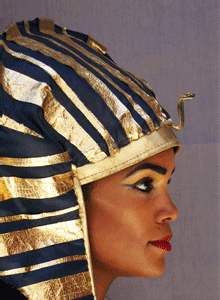In what he describes as an ancient version of “Empire,” referring to the popular FOX television drama series, Playwright Timothy Lawrence Hogan is seeking to tell the story of Hatshepsut through his stage play Pharaoh. The stage play runs September 22 – 24, 2017 at Theatre Project located at 45 W. Preston Street in Baltimore City.
Hogan describes Pharaoh as a play that examines the complex journeys of empowered, self-determined women who dare to seek positions of power, and thrive in doing so in a man’s world. It brings to the forefront the various trials, tribulations, and obstacles women face, as well as societal attitudes towards them. Its themes of religion, sexual politics, race, and gender-identity, are as relevant today in our times, as they were 3,000 years ago, according to Hogan.
“The story of Hatshepsut has never been adapted for the stage or the screen,” said Hogan. “She ruled the world and was one of the most successful female pharaohs. She encountered opposition throughout her life, including a power struggle with the males of that time. She even wore male garb.
The power struggle of black men and women is still going on today. However, Hatshepsut rose to power despite the conflicts and obstacles she faced. Her story shows what black women are capable of achieving, and their modern relevance. She was more powerful than Cleopatra.”
According to History.com, Hatshepsut was only the third woman to become pharaoh in 3,000 years of ancient Egyptian history, and the first to attain the full power of the position. History.com also notes that Cleopatra, who also exercised such power, would rule some 14 centuries later. In their biographical write-up History.com further points out that Hatshepsut extended Egyptian trade and oversaw ambitious building projects, most notably the Temple of Deir el-Bahri, located in western Thebes, where she would be buried. Depicted (at her own orders) as a male in many contemporary images and sculptures, Hatshepsut remained largely unknown to scholars until the 19th century, and probably died around 1458 B.C.
“Men tried to wipe her out from history, and her story almost became lost before it was rediscovered in the 1800s,” said Hogan. “I first wrote this as a screenplay, which took about a year to write. I then decided to adapt it into a screenplay, which took about six months to write. Her mummy, which had been missing for 3,000 years, was discovered six months after I wrote the play.”
Hogan, a native of Washington, D.C. is also a director, visual artist, singer, songwriter, classical symphonic composer and a surrealist painter. His other plays include Warriors of Spain and Nefertiti and the Rebel King. According to Hogan, his diverse poetic style and range is a reflection of literary influences spanning multiple eras. A graduate of the Ellington School of the Arts, Hogan says he is an avid reader, and loves classical literature and ancient history.
“My hope is that people will come see this play and be inspired by the story,” said Hogan who plans to launch a GoFundMe page to raise funds to support future showings of the production. “I also hope people understand the importance of showing each other respect, and that it transfers over to modern relationships.”
Michal Roxie Johnson portrays Hatshepsut and several other characters in the production.
“Tim and I have done this play before, but I wanted to do it again because not enough people have seen it,” said Johnson, who is also the production’s director. “I love Hatshepsut and how powerful she was. She took the position of not saying, ‘I can’t do this because I am a woman.’ I also like the fact that she had one of the most peaceful reigns as a pharaoh. I feel that if a woman is in charge, we wouldn’t have so much war.”
The Baltimore native has a company called AMillionMees Productions, LLC and has been in several other plays, which include Witness for the Prosecution, Jitney, and East Texas Hot Links.
“Hatshepsut didn’t allow anyone or anything to put her in a box,” said Johnson. “Hatshepsut shows other women and girls that they don’t have to let anyone confine them to a box either. Hatshepsut is the type of character that people get torn between because you like her and then you don’t like her.”
But it’s easy to understand why she did what she did. She had to forge her own path. It is so motivating and I want people to feel that same motivation. Dreaming big is not a crime, and going for what you want. Ambition is divine, and kudos to Tim for writing this piece.”
Tickets are $22 in advance and $25 at the door. For more information call 443-424-8260 or visit: www.thefemaleking.com
